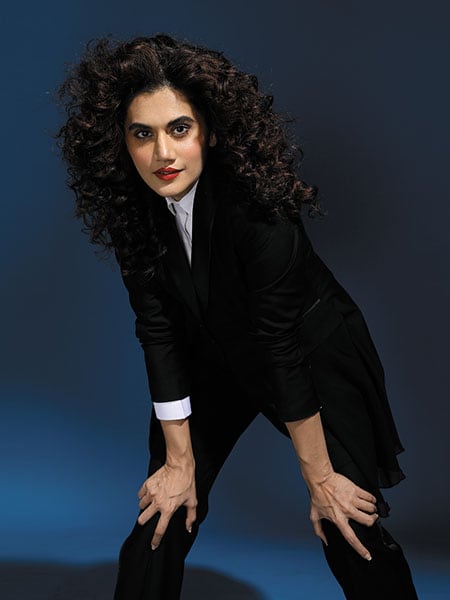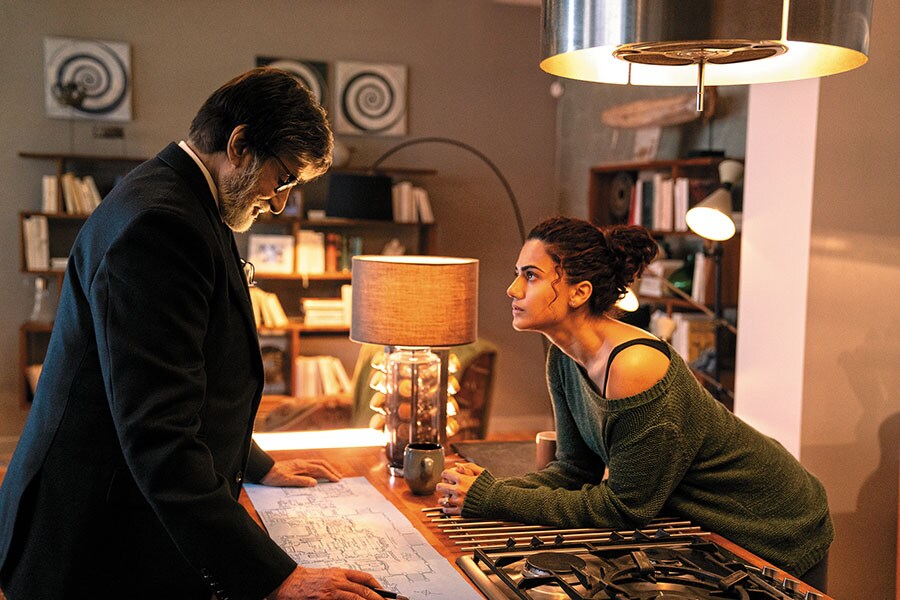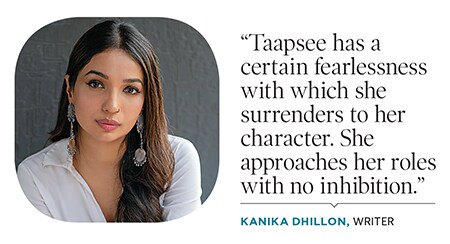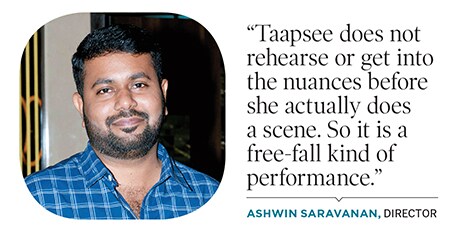Taapsee Pannu: Girl, uninterrupted
Taapsee Pannu is the underdog who has made it big in a long, zig-zag climb to the top. And she shows no signs of slowing down


 Styling: Yatan Ahluwalia Production: Sahil Vig/ Y&E Consultancy & Services Styling Assistant: Udit Jain Makeup: Savleen Manchanda Hair: Kanta Motwani Suit: Raghavendra Rathore
Styling: Yatan Ahluwalia Production: Sahil Vig/ Y&E Consultancy & Services Styling Assistant: Udit Jain Makeup: Savleen Manchanda Hair: Kanta Motwani Suit: Raghavendra Rathore
Image: Mexy Xavier[br]Taapsee Pannu doesn’t belong. Not to one industry, one language, one film family, or one Bollywood camp. And this—trading comfort to satisfy curiosity, and security to embrace the unknown—is not new to her. After all, she’s the engineer who let go of a lucrative Infosys job offer to sign a film in an unfamiliar language (Telugu) she’s the Delhi girl who moved out of her home to settle down in Hyderabad for the initial three years of her career, and she’s the performer who backed unconventional scripts that many of her contemporaries were sceptical of taking up.
“I never stay put in one place, or do just one kind of thing, because I get bored of people easily,” says the actor, seated comfortably in her vanity van that is parked inside Mehboob Studios in Mumbai. The 32-year-old admits to being a jack of all trades and a master of none, which possibly explains her quest to take on and straddle four to five different films every year. “No two characters, stories, genres—and sometimes even the languages—are the same. And that helps me enjoy going to the set every day,” she says.
The Indian film industry, particularly Hindi cinema or Bollywood, is notorious for taking pride in not guaranteeing a secure future to even the fittest who survive the rat race. Thousands of aspirants spend hours building their portfolios, attending countless auditions, tolerating failures and avoiding unscrupulous elements wanting to exploit their ambition. But most of them remain nameless, labelled merely as “strugglers” in industry parlance. Pannu could, in that sense, be a case study for what it takes for a nobody, an outsider with no industry godfather, to make it big. And not just make it big, but make it count.
The last two years—as Pannu debuted and sealed her place in the Forbes India Celebrity 100 List—have seen the actor move beyond the lingering adulation that followed her performance in the 2016 Shoojit Sircar production Pink. She is at rank 68 this year.
The actor has had four releases in three languages in 2019 and has lined up multiple creative challenges ahead of her: Among other films, she is all set to play Mithali Raj, the former captain of the Indian women’s cricket team. She will feature in a film on gender parity called Thappad directed by Anubhav Sinha, who has signed her on once again after their 2018 courtroom drama Mulk, and will also star opposite Jayam Ravi in a Tamil espionage thriller.“Taapsee’s filmography typifies the struggles of a woman keen on substantial roles in India’s men-centric film industries,” says film critic Anna MM Vetticad, who believes that even as Pannu managed to notch up excellent roles since her debut Tamil film Aadukalam, she has also done several marginal, stereotype-ridden roles in “tacky films undeserving of her”. It is to Pannu’s credit, Vetticad explains, “that even in the worst of these, such as Mr Perfect (Telugu), Baby (Hindi) and Neevevaro (Telugu), her striking screen presence drew attention. This, along with her talent and beaver-like persistence, have led to the strong position she is in today.”
As She Pleases
Pannu’s disposition of multitasking and compartmentalising her priorities traces its way back to her childhood in Delhi, where she, while being an academically-inclined student of Mata Jai Kaur Public School, often rushed to partake in sports, public speaking and dancing. As part of the latter, she took Kathak lessons for eight years and Bharatnatyam classes for two. “I have been performing on stage since the age of six, and I have been in love with it since,” she says. Growing up, she took to modelling and working in ad films, even as she simultaneously went through the rigours of securing an engineering degree from the Guru Tegh Bahadur Institute of Technology in Delhi.
The actor admits that her family, comprising her parents and younger sister Shagun, continue to live a low-key life. Unlike her, she says, they are neither comfortable being the centre of attention nor have completely come to terms with how to deal with her stardom.
“My father never thought much of my profession. After all, he was a man who gave up the family business of spare parts to his brother and opted for a nine-to-five salaried job in finance because he did not want to go through the ups and downs of business,” Pannu recollects. “Even when I settled in Hyderabad to work in the South film industry, my father believed that I’ll soon fall short of money, face the stark realities and risks of this profession, and come back home.” Taapsee Pannu played a businesswoman accused of murder while Amitabh Bachchan played a lawyer in Sujoy Ghosh’s Badla
Taapsee Pannu played a businesswoman accused of murder while Amitabh Bachchan played a lawyer in Sujoy Ghosh’s Badla
Image: Courtesy Red Chillies Emtertainment[br] That, clearly, was not to be. Industry experts Forbes India spoke with believe that the actor’s sharp instinct and careful discernment while picking roles have ensured that she goes from strength to strength even with limited screen time. Her films Baby, The Ghazi Attack, Soorma and Mission Mangal are cases in point. Colleagues believe that her spontaneity on set often adds new dimensions to her characters.
Filmmaker Sujoy Ghosh says Pannu’s unpredictability as a performer, where she does something different in every take, is what he enjoys about her. “She makes me think in a way I did not before. Her reaction to certain situations is interesting,” he says. “In Badla, for example, I had imagined her character Naina to be worried in the beginning since she is framed for murder and placed under house arrest. But Taapsee chose to portray that Naina is not scared or submissive at all because the character’s play, according to her, is that she has not committed the murder in the first place… I agreed to that interpretation.”
Pannu admits that being self-trained, she often prefers her approach to be spontaneous rather than prepared. She dreads auditions and picks her roles instinctively, no matter what everyone else thinks. Her latest release Saand Ki Aankh, for instance, where she played a sexagenarian sharpshooter Prakashi Tomar, kicked up a storm around ageism. Senior actors questioned why two women in their early 30s were playing 60-year-olds using prosthetic makeup, when the makers could have cast age-appropriate actors. Pannu responded too, wondering why the ageism debate was not sparked when Aamir Khan [a man then in his 40s], played a college student in 3 Idiots, or when a young Anupam Kher played an aged father in Saaransh.“Have we really lost the shoulder along with our spine to support people who venture out of their comfort zone to bring about a change? Or is it just reserved for two females who, at [a] relatively nascent stage of their career, venture out to do something, which we were told, most people turned down?” she tweeted.
Her decision to back a project, she tells Forbes India, depends on whether she trusts the sensibilities of the filmmaker and his expertise to pull off the script she/he is presenting. “I said yes to Mulk and Saand Ki Aankh despite everyone around me asking me not to do it, because if I really like and believe in a script, I am not really affected by what anyone else thinks or says.”
Her confidence in debutant director Tushar Hiranandani, for instance, came from his vision of how Saand Ki Aankh should be presented. The reality, Pannu continues, is that films shouldered by women still bank on word of mouth, while people queue up outside theatres on weekends to watch a masala big hero film.
Saand Ki Aankh, however, was budgeted and treated as an out-and-out commercial project from the get-go. “It was full of taali-seeti moments, with low-angle, 48-frames and slow-motions shots. It looked like Tushar was shooting a hero, not two old women,” she says. “That’s how you bridge the gap today, and make the audience digest experimentation and gender-neutral content.”
Kanika Dhillon, writer of Anurag Kashyap’s Manmarziyaan—a film Pannu believes gave her one the most “liberating” roles—is amazed at how the actor is able to deconstruct various layers of her characters, and her craft and audience. She says Pannu understood the rawness and unpredictability of Manmarziyaan’s protagonist Rumi, and translated her soul from paper to screen. “Taapsee has a certain fearlessness with which she surrenders to her character. She approaches her roles with no inhibition,” Dhillon says.
This fearlessness, however, came to Pannu only around 2015, two years after she moved to Mumbai for her Bollywood debut Chashme Baddoor—a remake of Sai Paranjpye’s 1981 film of the same name—helmed by David Dhawan. For three years prior to that, as she navigated her career trajectory around the South Indian film industry after her debut with Telugu film Jhummandi Naadam in 2010, she was made to believe that working with big heroes, producers and directors is the key to making it big in the industry, even if it means settling for insignificant roles.
She agreed to this norm, Pannu admits, because it gave her a decent amount of money. Given her father’s initial scepticism about her career choice, “it was a big thing for me to earn money, sustain and be stable”. Her father, who also handles her finances, had drawn her a monthly expenditure sheet. If she spent anything more, or earned anything less than a certain amount, she would not be able to manage, he warned.
Those days, Pannu aspired to have a certain bank balance. “Once I finally reached that mark, around 2015, I realised that the fear goes away, and you become powerful in the true sense. Then you stop making wrong decisions for the sake of money.” Her lifestyle, she says, continues to have “regular middle-class traits”. The only extravagance she indulges in, which is a world apart from the life she lived with her parents, is to “travel a lot and stay in good hotels in different countries… that’s where my money goes. Otherwise, it’s all basic,” she says.
Building her Brand
True to her tendency of not sticking to one thing to avoid boredom, Pannu maintains diversified interests. She runs a wedding planning startup The Wedding Factory with her sister Shagun, and co-owns the Pune 7 Aces franchise in the Premier Badminton League. The squad, which included ace Spaniard Carolina Marin in the previous edition, has players like Chirag Shetty, Chris Adcock and Hendra Setiawan after its latest round of auctions.
Pannu, who used to play badminton when she was younger, describes herself as an entrepreneur who does not get involved in the day-to-day operations of her ventures, but cannot be completely hands-off as well. “My sports venture is still in the beginning stages. There will be hiccups, and tough decision-making to be done in the initial years. Once that is stable, I will move on to something else,” she says, thinking aloud about her interest in entering the food and restaurant space. According to her, whatever be the project, she ensures that it’s a solid collective effort.
Her being a team player who gives proactive insights to fill gaps in the script, and her no-nonsense approach to her craft makes the filmmaking process come alive, says Ashwin Saravanan, who directed her in Game Over. The film released in Tamil, Telugu and Hindi earlier this year. “Taapsee does not rehearse or get into the nuances before she actually does a scene. So it is a free-fall kind of performance where she goes straight into the material, and manages to surprise herself and the people around her,” he says.
Game Over is centred around Pannu’s game designer character Swapna—a sexual harassment survivor with post-traumatic stress disorder and a chronic fear of the dark—who has to outsmart a serial killer who has broken into her home. The protagonist, therefore, has to portray heightened physical and emotional stress on screen. Despite the fact that she did not speak either Tamil or Telugu fluently, Saravanan says not a single retake had to be done because of language restrictions.
“Taapsee dives into the most emotional scenes easily and comes out unscathed. She never makes a big deal of it,” he says, recollecting how she used to play Ludo with her team during breaks. “She is never silent or brooding on the set, and it is always fun. But when it is time for the shot, she always transforms herself to do what is necessary.”
Pannu’s choice of films, be it Badla, Game Over or Mission Mangal, are consistent with her public image—of a strong, independent, fun, yet responsible woman—say experts. This endears the actor to an entire product category of brands targeted at young females, including personal care, fitness and technology, believes Aviral Jain, managing director, Duff & Phelps. The consulting firm brings out an annual report on celebrity brand valuation. He explains that Pannu’s portfolio of endorsements widened from nine last year to 12 this year, and includes brands like Honda, Bajaj NoMarks, Horlicks Woman, Garnier Color Naturals, Melange by Lifestyle, Coverfox, Panasonic and GOQii.
“Given her recent box office success, she has also been able to push her endorsement fee by a notch. Ad agencies involved say there could be a bump up anywhere between 30 percent and 40 percent or even 50 percent in case of some brands, in which case she could charge close to ₹1 crore to ₹1.5 crore per brand on a per day basis. Until last year, she was definitely in the range of ₹60 to ₹80 lakh,” says Jain. At the time of going to press, Duff & Phelps had not come out with their celebrity brand valuation report for 2019, but Jain believes that Pannu is definitely within the top 30 endorsers of the country, if not the top 25.
“Taapsee is consolidating herself in a niche positioning, which is linked to the kind of characters [she plays] in the movies. Her popularity on social media is also taking her to smaller towns and cities, thus enabling her to sign on mass-market products. The addition of Kurkure to her portfolio this year is an example of that,” Jain says.
According to Vetticad, Pannu’s success across India’s three largest film industries—Kollywood (Tamil), Tollywood (Telugu) and Bollywood—distinguishes her from most of her contemporaries, female and male, who play leads in mainstream cinema. “Her pan-India presence—when combined with her glamorous looks, her willingness to take on potentially risky cinema, her off-screen outspokenness, and her hunger for solid roles at a time when a small but significant number of Indian filmmakers are challenging patriarchal norms—has seen her push boundaries down a path that is uniquely her own,” she says.
Pannu likes to think of her profession, and the legacy she is building, in much simpler terms: “If people take my characters home with them when they step out of the movie hall, I’ll consider it a job well done.”
First Published: Dec 24, 2019, 11:29
Subscribe Now
